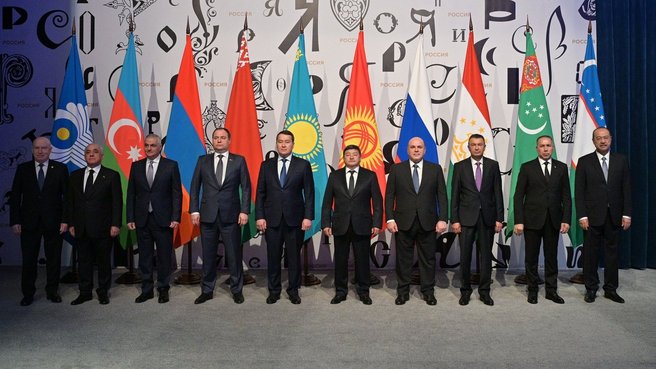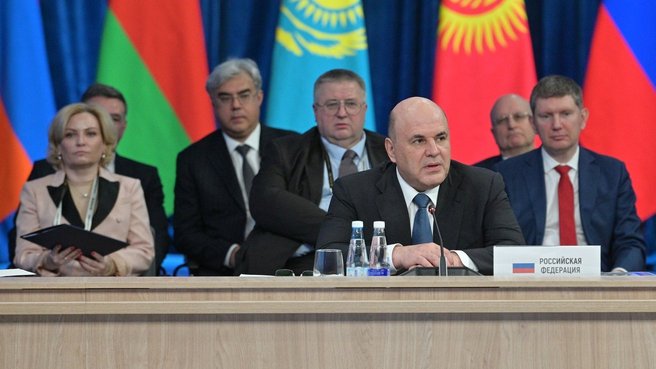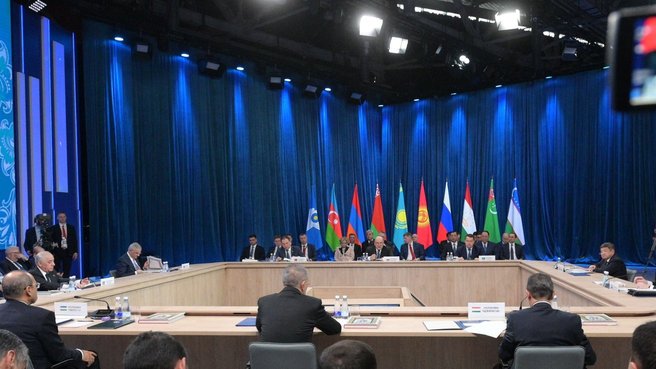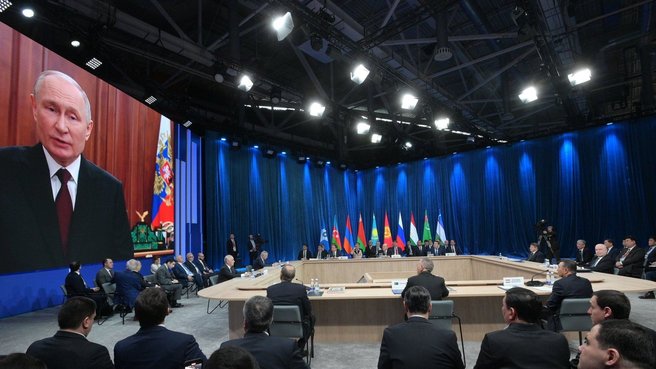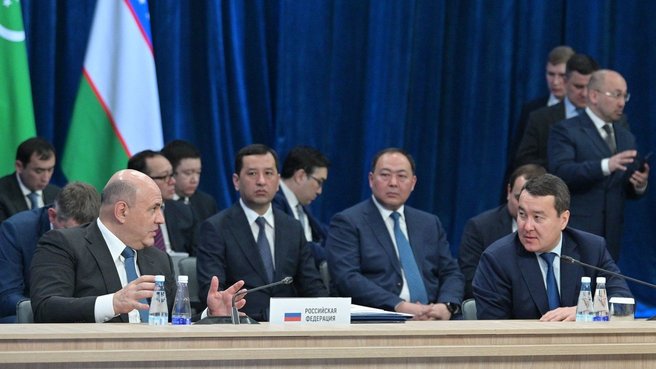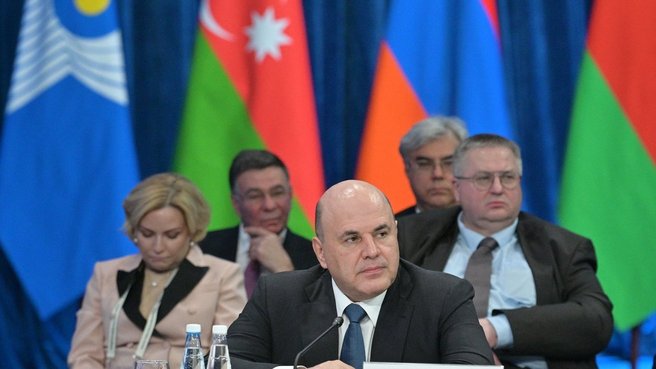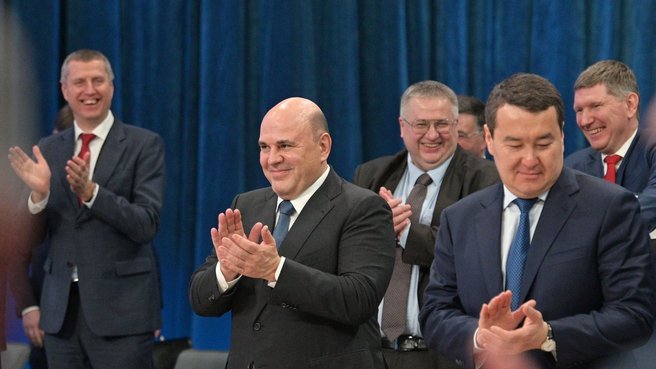The main item on the agenda is the expansion of cultural and humanitarian cooperation within the Commonwealth. Following the meeting, the heads of government signed a statement on the plans for cultural and humanitarian cooperation.
Heads of delegations taking part in the meeting of the CIS Council of Heads of Government:
Joint photo session for heads of delegations taking part in the meeting of the CIS Council of Heads of Government
Prime Minister of the Republic of Azerbaijan Ali Asadov;
Deputy Prime Minister of the Republic of Armenia Mher Grigoryan;
Prime Minister of the Republic of Belarus Roman Golovchenko;
Prime Minister of the Republic of Kazakhstan Alihan Smailov;
Chairman of the Cabinet of Ministers and Chief of Staff of the Presidential Executive Office of the Kyrgyz Republic, Chairman of the CIS Council of Heads of Government Akylbek Japarov;
Prime Minister of the Russian Federation Mikhail Mishustin;
Prime Minister of the Republic of Tajikistan Kohir Rasulzoda;
Deputy Prime Minister of Turkmenistan Hojamyrat Geldimyradov;
Prime Minister of the Republic of Uzbekistan Abdulla Aripov;
General Secretary of the CIS Sergei Lebedev.
Excerpts from the transcript:
Akylbek Japarov: Colleagues and meeting participants,
The meeting of the Council of Heads of Government is declared open.
Allow me first of all, on behalf of those present and from myself, to express our deep gratitude to the Russian side, personally to Mikhail Mishustin for inviting us to Moscow, for the traditional hospitality and for the excellent and informative programme of our stay in the Russian capital.
As Chairman of the CIS Council of Heads of Government, I would like to invite Prime Minister of the Russian Federation, and the initiator of today's meeting, Mikhail Mishustin, to speak first.
Please, Mr Mishustin.
Mikhail Mishustin: Thank you, Mr Japarov. Friends,
First of all, I am very grateful to you for responding to our initiative – the invitation to take part in the meeting of the CIS Council of Heads of Government in Moscow on the eve of the New Year. This is a good opportunity to review our results and talk about our plans for the future.
I propose beginning our work with a video address of President of the Russian Federation Vladimir Putin.
Vladimir Putin: Colleagues, friends,
I am glad to welcome all of you, participants in the meeting of the Council of Heads of Government of the Commonwealth of Independent States.
Today’s meeting is dedicated to a truly important topic: the development of cultural cooperation. It is precisely the close cultural interconnectedness and spiritual closeness of our nations, as well as the extensive human contacts and the centuries-old shared history of life in a single state that are the solid foundation on which integration processes within the CIS are built.
I believe you will agree that we have inherited a truly unique civilisational alloy of traditions and customs, languages and literature, art and folk culture. Our task is to preserve this common multinational heritage to the greatest possible extent and to enrich it with new content.
It is, therefore, quite natural that during Russia’s CIS chairmanship, which will begin on 1 January, we are planning to continue to expand the practice of holding a wide range of joint events dealing with diverse aspects of art, education and science, including involving the CIS Interstate Humanitarian Cooperation Fund.
We will encourage the implementation of film and television projects, as well as the organisation of classical and popular music competitions in every possible way. Let me remind you that Russia has already put forward a number of relevant initiatives, including on the creation of the Eurasian Academy of Film Arts, the establishment of the Eurasian Film Award, and the revival of the Intervision International Song Festival. We count on a favourable reaction from our CIS partners.
Of course, we are aiming to continue the closest possible cooperation on preserving the memory of our common past and combatting attempts to falsify history and glorify Nazism. The search movement has an important role to play in this work along with significant events in memory of those killed during the Great Patriotic War, such as the Immortal Regiment, St George Ribbon, and Memory Train, aimed at acquainting people in our countries, including young people, with history and places of military glory.
Of course, during its chairmanship, Russia will pay special attention to the topic of preserving our common heritage: Russian language, which has remained the language of interethnic communication for hundreds of millions of people, both in our countries and around the world.
Let me remind you that the Treaty on the Establishment of an International Russian Language Organisation was signed at the Bishkek summit on 13 October. This organisation, which will have its headquarters in Sochi, is intended to protect and promote Russian language as the key to mutual understanding and free communication both within the CIS and beyond. It is now important to resolve the practical issues of how the organisation will function, to draft its founding documents, and also to prepare and hold its first ministerial conference.
Fitness and sport are an integral component of the concept of humanitarian cooperation. The Commonwealth is also doing a lot in this area: the CIS Games and other sports competitions are held on a regular basis. In February, Kazan will host the innovative Games of the Future, which combine classical and e-sports, and in June, the BRICS Games. We expect that athletes from the Commonwealth countries will take an active part in them.
There is also an important event ahead: the World Youth Festival in Sochi in March 2024. This major forum will bring together young people from all over the world, and representatives from more than 180 countries are expected to attend.
Friends,
It is quite symbolic that our meeting is taking place at the VDNKh complex. I think that you have already had time to visit the International Russia Expo Exhibition and Forum.
This exhibition is of great interest, and it has already been visited by several million people, both Moscow residents and numerous tourists, who, by the way, enjoy visiting the renovated national pavilions of the Commonwealth states located at VDNKh. And in this way, visitors get an opportunity to learn about the traditions, culture, and modern life of the peoples in your countries. And this helps us to understand each other better, in fact contributing to the further strengthening of the bonds of friendship between all CIS members.
In conclusion, I would like to extend my birthday greetings to the Prime Minister of Kazakhstan, who is present at the meeting, and to wish him good health and prosperity.
I would like to ask you to convey my warmest greetings to the leaders of your countries, whom I expect to see very soon, at the end of December at a meeting of the Supreme Eurasian Economic Council and the traditional informal meeting of CIS leaders in St Petersburg.
And, of course, colleagues and friends, my best wishes for the New Year. I wish you, your families, friends, and the people of your countries good health, happiness, well-being, peace and prosperity.
Thank you for your attention.
Mikhail Mishustin: Friends,
Before we get down to discussing the agenda, I would like to cordially wish a happy birthday to Prime Minister of the Republic of Kazakhstan Alikhan Smailov. Mr Smailov, I wish you strong health, a happy family life and all the best to you, your family and friends. I also wish you new successes in your responsible position, including during your work within the Commonwealth of Independent States.
I would also like to congratulate our Kazakhstani friends on their national holiday, Kazakhstan Independence Day. I wish prosperity to the fraternal people of Kazakhstan and all of the country’s people.
Colleagues, Russia attaches special significance to expanding interaction within the Commonwealth of Independent States. This is a unique and popular platform for discussing significant multilateral cooperation issues for the benefit of our people.
I would like to thank our Kyrgyzstani partners and Akylbek Japarov for their productive chairmanship of the CIS governing bodies throughout 2023. Of all the important decisions made within the Commonwealth of Independent States format, I would like to single out the signing of the agreement on free trade in services that complements the free commodities trade zone, established in 2014. This document creates a foundation for elevating our relations to a new level.
Russia will assume CIS chairmanship in 2024. President of Russia Vladimir Putin has said that our priorities include deeper economic interaction, expanded cultural and humanitarian ties, and efforts to merge Eurasian integration projects. Together, we have visited the International RUSSIA EXPO Exhibition and Forum that showcases the achievements of Russia’s regions and the key projects involving the CIS states. The CIS countries boast an impressive industrial, energy and agricultural potential, as well as abundant energy resources and, most importantly, talented human resources.
Our consolidated efforts and dynamic and productive activities will open additional opportunities for close interregional integration and for the development of all of our countries. We see this as the main priority of the Russian chairmanship.
Today’s meeting is dedicated to cultural and humanitarian interaction. It is no exaggeration to say that this area has always been among the commonwealth’s priorities.
Much is being done in this regard. We sponsor forums, congresses for teachers, educators and young people, competitions, festivals, and many other events that always raise considerable interest. These are supported by the CIS Interstate Humanitarian Cooperation Fund, among other sources.
We regularly hold our themed years. This year is the Year of the Russian Language as a Language of Interethnic Communication in the CIS. As part of this year, the CIS leaders signed the Agreement on the Establishment of the International Organisation for the Russian Language, in Bishkek in October. We as heads of government will ensure that it starts its practical activities, something that will promote our common heritage – the Russian language – on the Eurasian continent. As a result, this will certainly strengthen our neighbourly and fraternal relations.
The next year will be dedicated to the volunteer movement, and the year after that – to the 80th anniversary of Victory over Nazism in the Great Patriotic War. It will also be the Year of Peace and Unity in the Fight against Nazism.
Many events have been planned. Actions and processions held as part the International Immortal Regiment Movement both in Russia and other countries have special importance.
I know that similar events are being organised in Belarus and Kazakhstan, to name just two countries. These initiatives are of much importance for preserving history and for educating the younger generations. We are as proud of the feats of valour achieved by our ancestors as we are of their merits, and we must hand this memory down to the next generation.
The commonwealth’s Cultural Capitals Interstate Programme is yet another positive initiative, with St Petersburg performing this mission in the outgoing year and Samarkand taking over in 2024.
By the way, we can congratulate our Uzbek colleagues because this ancient city with centuries-old history has been officially announced as the venue for the 43rd Session of the UNESCO General Conference. As for Tashkent, it will be the first CIS Youth Capital in 2024. This new project will help young people become better acquainted with the cultural wealth of the countries in our common region and make their own contribution to the integration processes in the CIS space.
I would like to dwell separately on our joint activities in the education area. Russian-built schools are opening in the CIS countries, where classes are held in Russian with the highest academic standards.
There are five functioning schools like this in Tajikistan, and a large project is being planned for Kyrgyzstan. We are considering other proposals as well to enable children to become better acquainted with Russian culture in the course of their education.
We also provide opportunities for CIS citizens to earn an education at Russian universities. In addition, there are
branches of Russian universities abroad, and we are expanding academic and teacher
exchanges. All of this helps strengthen our humanitarian ties.
